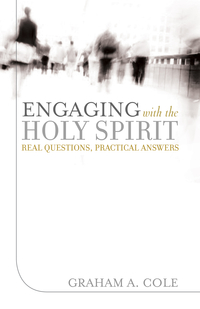Graham Cole: Engaging with the Holy Spirit
 Graham A. Cole, Engaging with the Holy Spirit: Real Questions, Practical Answers (Wheaton: Crossway, 2008), 125 pages.
Graham A. Cole, Engaging with the Holy Spirit: Real Questions, Practical Answers (Wheaton: Crossway, 2008), 125 pages.
Graham A. Cole teaches biblical and systematic theology at Trinity Evangelical Divinity School in Deerfield, Illinois. Readers of The Pneuma Review will probably remember his excellent contribution about pneumatology, also from Crossway, entitled He Who Gives Life (2007). This brief book seems to have grown out of the same research but aimed at more popular audience.
Indeed, herein Cole seeks to biblically – and sequentially – address six questions, all of which are both crucial and common, about the person and the works of the Holy Spirit. Cole contends that despite the growth of the charismatic movement and Pentecostal churches, people still have questions – even troubling concerns – about the person and work of the Holy Spirit. These real questions are the burden of this book, questions that affect a person’s relationship to the Spirit, including: 1. What is blasphemy against the Holy Spirit?; 2. How does a person resist the Spirit?; 3. Ought we to pray to the Spirit?; 4. How do we quench the Spirit?; 5. How do we grieve the Spirit?; and 6. How does the Spirit fill us?
Each chapter is devoted to only one question and challenges readers about their relationship with the Spirit, as well as about Christian living in general. Readers are also given key elements for thinking theologically about contemporary issues, as well as further implications regarding their belief and behavior. Notably, thinking theologically, according to Cole, involves three specific components, all of which are necessary to “run the race with endurance.” First, viewing the Word of revelation, illuminated and applied by the Spirit, as foundational for life and thought. Secondly, taking heed to the “great cloud of witnesses” in Christian history. Third, recognizing the human predicament in the world as living in-between the Cross and the coming reign of God on the new earth. Taking these three into consideration enables one not only to reflect correctly on the Holy Spirit, but also to work (actively) wisdom in the day(s) at hand. After all, theology without application is ‘abortion’ (17). In sum, this is a reader-friendly book – both brief and full of solid, reassuring answers, and should be a welcome addition to any library.
Reviewed by Bradford McCall
Category: Spirit


